Posts Tagged ‘Ronald Harwood’
PEN Journey 41: Berlin—Writing in a World Without Peace
PEN International celebrates its Centenary in 2021. I’ve been active in PEN for more than 30 years in various positions and now as an International Vice President Emeritus. With memories stirring and file drawers of documents and correspondence bulging, I am a bit of a walking archive and have been asked by PEN International to write down memories. I hope this personal PEN journey will be of interest.
I first visited Berlin in the fall of 1990 just after Germany reunited. I was living in London and took my sons, ages 10 and 12, to witness history in the making. I returned on a number of occasions, researching scenes for a book, attending meetings, and visiting German PEN in preparation for PEN’s 2006 Congress. Each time Berlin’s face was altered as the municipalities east and west moved to become one city again.
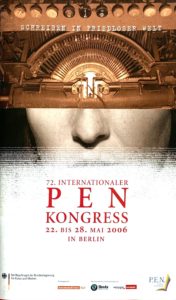
PEN International’s 72nd World Congress, Berlin, 2006
At the time of PEN’s Congress in May 2006, Berlin was bedecked with water pipes above ground—pink, green, blue, red—before the city buried its plumbing and infrastructure beneath the streets. Portions of the city had the appearance of an amusement park; there were also sections of the Berlin Wall with its colorful graffiti still standing, more as art exhibit than stark barrier to freedom.
“Welcome to a United Berlin” the German PEN President headlined his letter to the 450 delegates and participants for PEN’s 72nd World Congress. The Congress theme “Writing in a World Without Peace” was challenged by the reunification of Berlin and Germany, a historic event which bode well for the prospects of peace and which stood in contrast to the history that had come before. Yet the globe was still in conflict in the Middle East, in Asia and in Latin America where writers were under threat.
“There are countries such as Iran, Turkey or Cuba, where authors are jailed because of their books,” noted International PEN President Jiří Gruša. Resolutions at the Congress addressed the situations for writers imprisoned or killed in China, Cuba, Iran, Mexico, Russia/Chechnya, Sri Lanka, Uzbekistan, Vietnam, and other countries.
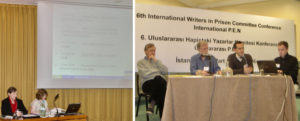
Left: Writers in Prison Committee (WiPC) meeting at Berlin Congress. Karin Clark (Chair WiPC) and Sara Whyatt (WiPC Program Director). Right: WiPC Conference in Istanbul: Eugene Schoulgin (Norwegian PEN/PEN Board), Jens Lohman (Danish PEN), Jonathan Heawood (English PEN), Notetaker
Two months before in March, over 60 writers from 27 PEN centers in 23 countries had gathered for International PEN’s Writers in Prison Committee conference in Istanbul where the WiPC planned a campaign against insult and criminal defamation laws under which writers and journalists were imprisoned worldwide. The conference also addressed the recent uproar over the Danish cartoons, impunity and the role of internet service providers offering information on writers, especially in China. A working group formed to support the Russian PEN Center which was under pressure from the Russian government.
Berlin, however, was sparkling and filled with the energy of reunification. “Today, this city—once separated by a Wall most drastically manifesting the division of Germany and Europe—has not only been re-established as the capital of Germany, but has simultaneously turned into a thriving meeting-place between East and West and North and South,” welcomed Johano Strasser, German PEN President. “Here in Berlin, history in all its facets—from the great achievements of German artists, philosophers and scientists to the crimes of the Nazis—has left its mark on the urban landscape.”
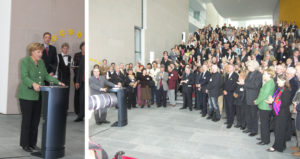
Left: German Chancellor Angela Merkel addressing PEN members at 72nd PEN Congress, 2006; Right: PEN International President Jiří Gruša speaking to PEN delegates and members at the Federal Chancellery; front row: German PEN President Johano Strasser, Chancellor Angela Merkel and PEN International Secretary Joanne Leedom-Ackerman. [Photo credit: Tran Vu]
The keynote address by Nobel laureate Günter Grass challenged the conflicts around the globe and the countries engaged in them. “There has always been war. And even peace agreements, intentionally or unintentionally, contained the germs of future wars, whether the treaty was concluded in Münster in Westphalia, or in Versailles,” he said.
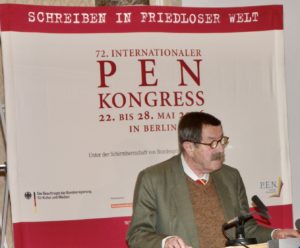
Nobel laureate Günter Grass addressing Opening Ceremony of PEN International’s 72nd World Congress in Berlin, 2006 [Photo credit: Tran Vu]
As I sat on the dais on the edge of the stage listening to this renowned German writer, I leaned over to Jiří and said, If there is a standing ovation, I can’t stand. I was concerned. Grass could say and think whatever he wanted, but PEN was a non-political organization. Whatever my views of my country’s foreign policy, I was an American; I was also the mother of a son in uniform. Jiří leaned back to me and said in effect: Don’t worry, I won’t stand either. The speech ended with applause but no ovation, and then everyone got up and went to the next event.
It wasn’t my role to argue with Günter Grass even had the occasion allowed. But it was important that PEN assure the open space for debate existed which it did later in the Congress workshops and programs. PEN was filled with a multitude of points of view among its members; it did not have a litmus test of politics, only a commitment to the free expression of ideas. It offered a wide tent where views could be debated and challenged. Dogmatic political certainties often fell on their own in the alchemy of literature and imagination.
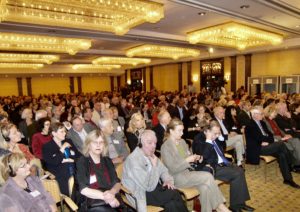
PEN members and delegates from around the world at Opening Ceremony of 2006 PEN Congress [Photo credit: Tran Vu]
Programs at the Congress also featured Nobel laureate and PEN International Vice President Nadine Gordimer and writers from around the world, including former International PEN Presidents Ronald Harwood, and György Konrád, Bei Dao, A.L. Kennedy, Margriet de Moor, Péter Nádas, Per Olov Enquist, Mahmoud Darwish, Duo Duo, Jean Rouaud, Johano Strasser, Veronique Tadio, Patrice Nganang and others. These writers participated in the literary events, including an evening of African literature and one of writers of German literature who had immigrated from abroad to Germany or had non-German cultural backgrounds. Afternoon literary sessions included prominent PEN writers introducing authors of their choice, an afternoon of essays and discussions on the theme Writing in a World without Peace and a lyric poetry afternoon.
PEN’s 85th anniversary coincided with the 60th anniversary of the United Nations. Both organizations had been founded after a World War out of an idealism that arose from desperate times with the hope that the future could be better than what had just transpired. “Both organizations were founded on a belief in dialogue and an exchange of ideas across national borders,” I noted in my address to the Assembly of Delegates. “When U.N. members were writing the Universal Declaration of Human Rights, the framers consulted, among other documents, PEN’s Charter.”
PEN also had a history with the city of Berlin, where PEN members had gathered in 1926 for the first international meeting of importance held in Berlin after World War I. At that Berlin Congress tensions had arisen among old and young writers, writers from the west and the east, and debate had flared about the political versus the nonpolitical nature of PEN. The debate that stirred in Berlin in part led to the framing of PEN’s Charter the following year.
Since those early days, PEN had grown in size beyond what the founding writers might ever have imagined. After the 2006 Berlin Congress, with the addition of centers in Jamaica, Uruguay, and Pretoria, South Africa, PEN had 144 centers in 101 countries in almost every time zone. The PEN world didn’t sleep. Someone, somewhere was always awake doing something. Through its centers PEN International participated in at least a dozen conferences around the world each year, including meetings of its standing committees. PEN thought globally but worked locally.
Berlin—with its own alterations and progress—proved a fitting location for the presentation of International PEN’s new Three-Year Plan. For the past decade, since the 75th Anniversary at the Congress in Guadalajara, PEN International had been in an organizational reformation. It now had a governing structure with a global Board that participated in decision-making; it had revised its Constitution and Rules and Regulations; it had developed a budget, increased its funding, and recently moved its offices into Central London to a larger space with cheaper pro rata rent and an elevator, which had meaning for anyone who had climbed the steep four (or five?) flights to PEN’s old offices. The staff size had also increased, and PEN had hired its first Executive Director, Caroline McCormick Whitaker, former Development Director from the British National History Museum.

International PEN Board meeting preceding 72nd PEN Congress in Berlin, May 2006. L to R: Eugene Schoulgin (Norwegian PEN), Judith Rodriguez (Melbourne PEN), Kata Kulakova (Chair Translation & Linguistic Rights Committee), Sylvestre Clancier (French PEN), Sibila Petlevski (Croatian PEN), Chip Rolley (Chair Search Committee), Karen Efford (Program Officer), Caroline McCormick Whitaker (Executive Director), Joanne Leedom-Ackerman (PEN International Secretary), Jiří Gruša (International PEN President), Peter Firkin (standing—Centers Coordinator), Eric Lax (PEN USA West), Jane Spender (Programs Director), Judith Buckrich (Women Writers Committee Chair)
Because British charitable tax law had changed, the opportunity had also arisen to unite International PEN and the International PEN Foundation into one charitable organization: International PEN, Ltd, a step that would provide the legal framework and protection for the organization and PEN’s name, would limit personal financial liability of the Board and attract a wider funding base. At the Berlin Congress, resolutions and approval were endorsed for this step which would be finalized the following year at the 2007 Congress in Dakar.
Caroline Whitaker took the Assembly of Delegates through the Three-Year Plan which had been developed after widespread consultation with PEN centers and the Board. She acknowledged that PEN couldn’t do everything that everyone wanted right away, that it was necessary to focus resources even as PEN developed more resources.
The Plan, which had grown out of all the discussions and preceding plans, concentrated on PEN’s three missions: to promote literature, to protect freedom of expression and to build a community of writers. “International PEN will work regionally to connect the activity of its many Centers around the globe on these issues,” Caroline told the delegates.

All PEN’s Standing Committees met at Berlin Congress—Writers in Prison Committee, Translation and Linguistic Rights Committee, Women Writers Committee and Peace Committee [Photo credit: Tran Vu]
In helping to develop PEN’s centers, the Three-Year Plan recommended International PEN focus on one region at a time, beginning with Africa where the 2007 PEN Congress would be held. International PEN would assist in programming and fundraising for development of PEN’s African Centers. The next regional focus would be Latin America, where PEN’s 2008 Congress was to be held. This rolling focus would allow the limited international staff to plan strategically. Regular daily work would still continue for the needs of centers in all regions.

PEN members met in workshops at 72nd Berlin Congress. Topics: PEN in the World—Global Issues; Education; the Strategic Plan; Centers; Networks and Partners; Asia and Central Asia; Middle East; Africa; Europe and Americas [Photo credit: Tran Vu]
As International PEN’s work had taken me across the globe that year, I’d come to see that PEN and its members formed a kind of intricate net which helped hold civil society together, the kind of sturdy net used on hills to prevent landslides. In a way that is what PEN members did around the world. They helped prevent literary culture and languages and freedom of expression from slipping away by both their active programming and their defensive actions
At the 1926 PEN Congress in Berlin International PEN’s President John Galsworthy and PEN’s founder Catherine Amy Dawson Scott had their voices recorded and preserved in a project of the German state. Galsworthy read a page from his Forsyte Saga. According to Dawson Scott’s journal, she recorded the following: “Even as individuals become families and families become communities and communities become nations, so eventually must the nations draw together in peace.”
It was a worthy, if not yet realized goal, but at least in PEN we had a global family.

Mayor’s reception for PEN members and participants at 72nd World Congress in Berlin, May 2006 [Photo Credit: Tran Vu]
Elections at 2006 Congress:
International PEN President: Jiří Gruša was re-elected for further 3-year term.
International PEN Board: Cecilia Balcazar (Colombian Center) and Eugene Schoulgin (Norwegian PEN re-elected to the Board)
Vice Presidents: Toni Morrison (American PEN) and J.M. Coetzee (Sydney PEN) elected Vice Presidents for service to literature and Gloria Guardia (Panamanian Center) for service to PEN
Women Writers Committee: Judith Buckrich (Melbourne Center) re-elected as Chair
Translation and Linguistic Rights Committee: Carles Torner (Catalan PEN) stood down as Vice Chair, replaced by Josep Maria Terricabras (Catalan PEN)
Next Installment: PEN Journey 42: From Copenhagen to Dakar to Guadalajara and in Between
PEN Journey 20: Edinburgh—PEN on the Move, Changes Ahead
PEN International celebrates its Centenary in 2021. I’ve been active in PEN for more than 30 years in various positions and now as an International Vice President Emeritus. With memories stirring and file drawers of documents and correspondence bulging, I am a bit of a walking archive and have been asked by PEN International to write down memories. I hope this personal PEN journey will be of interest
I begin with the memories…

Castle Rock and Edinburgh Castle in Edinburgh, Scotland
—the imposing walls around Castle Rock which stands above the city of Edinburgh and dates back to the Iron Age,
—the 12th century castle/fortress inside,
—the Old Parliament building,
—the New Parliament building where we sat in high-backed theater-style seats in an arena,
—the dorm room residence inside Pollack Halls where we stayed at Edinburgh University near the city center, beside an extinct volcano,
—the receptions at Parliament House and Signet Library and the City Arts Center where there was never quite enough food for the overly hungry delegates who descended upon the platters,
—the UNESCO seminars on women and literature, including my paper The Power of Penelope,
—and elections, so many elections and speeches—three candidates for Writers in Prison Committee (WiPC) Chair, seven candidates for International PEN President, nine Ad Hoc Committee members as precursors to a new governing board for International PEN.
These were the first contested elections I remembered in International PEN. A wider democracy was spreading with ballots and speeches. I also remember the tension and the occasional flares of anger, and the effort to hold us all together and ultimately the confident results and the determination to move forward in unity. International PEN President Ronald Harwood warned that while PEN badly needed to democratize “power” so it wasn’t too centralized, residing in the hands of a few, the delegates should not make the struggle personal and should go forward with a sense of humor. We were an organization of writers, not the government of the world, he admonished, warning members not to confuse bureaucracy with democracy.
—I remember the trip to Glasgow where a few of us had a stimulating visit and tea at the home of James Kelman (Booker Prize winner How Late It Was, How Late) who had been with us in the protests in Turkey a few months before (see PEN Journey 19) and the old Mercedes tucked in the garage in the working class neighborhood.
—And the Edinburgh International Festival, including the Edinburgh Book Festival, happening simultaneously all around us.
—And finally the exquisite August light in Scotland.

Program for 1997 PEN International Congress
I begin with memory then plunge into the minutes and documents of the 64th PEN Congress August, 1997 when delegates from 77 PEN centers around the world gathered. The Congress theme Identity and Diversity posed the questions:
In the contemporary world there are intense pressures, political or commercial, deliberate or unconscious, towards an imposed uniformity. One example is the effect on language. Indigenous languages, which embody particular traditions and experience, are in many countries under threat of displacement and extinction. These tendencies are inimical to literature which depends on its local personality for its color and effectiveness even when it achieves universal significance.
On the other hand, we live in an inter-dependent world where peace, prosperity and ultimately even survival, require co-operation. This international co-operation may be assisted by the use of a few languages which are widely understood. International exchange of the appropriate kind can also bring cultural enrichment.
How can these apparently contradictory objectives of diversity and co-operation be reconciled? Does literature have a role in this respect?
As with most abstract themes and questions, there is no simple answer, but the theme was a pivot, in this case both in the literary sessions and inadvertently in the business of PEN as the organization sought to restructure itself. Because this was my last congress as Chair of the Writers in Prison Committee, the work of that Committee absorbed my focus. My two reports—one the official printed International PEN Writers in Prison Committee report and the other an address to the Congress—observed, and in a fashion related, to this theme:
[Written report:]

PEN Writers in Prison Committee Report, 1997
Tension between the individual and the state underlies the work of PEN’s Writers in Prison Committee. In some countries constitutions and governing principles are set out to protect the individual from the state, but in the majority of countries which PEN monitors where writers are imprisoned, threatened or killed, the state is organized to protect itself from the individual. Whether those countries be totalitarian regimes like China, Myanmar/Burma, Syria, Vietnam, Cuba or democracies like Turkey and South Korea, when the state holds itself superior to the rights of its individual citizens, freedom of expression is seen as a threat to stability rather than a sign of stability.
In 1997 the Writers in Prison Committee has defended individual writers in at least as many of the new and older democracies around the world as in totalitarian states. Since 1990 dozens of nations in Latin America, Africa, Europe, and Asia have restored or initiated multi-party democratic elections. The turn to the democratic process initially freed up restrictions on writers and journalists in many countries. However, after the first flush of these freedoms, after dozens of independent publications sprang up in Argentina, Belarus, Cambodia, Ethiopia, Russia, Sierra Leone, Zambia, etc., tensions mounted between the individual voice and the state. Restrictions and press laws followed, and writers once again found themselves facing prison terms on such charges as “insulting the President”, “writing derogatory statements against the government and government officials”, and “seditious libel.”
In some states like Sierra Leone harsh restrictions on the media preceded coups and the loss of democracy. Reporting restrictions and brief detentions of journalists enforced by the crumbling Mobutu government in Zaire (now Congo), did not serve to protect it from its eventual collapse. Earlier this year the political crackdown in Belarus was preceded by severe censorship and curtailment of publications. The collapse of the government in Albania was followed by severe restrictions on publications and attacks and death threats on journalists and writers.
When a coup occurs and democracy fails, the consequences for free expression are usually disastrous as has been seen in Nigeria where journalists continue to serve lengthy prison terms and are arbitrarily detained, sometimes for months without charge. Another instance of a threat to freedom of expression in Nigeria is that of PEN member and Nobel laureate Wole Soyinka who is among 12 dissidents charged in Nigeria this year with the capital offense of treason. Soyinka remains free outside the country but is certain to be imprisoned if he returns.
Pressure on writers and the media continued or increased in many new and old democracies, including Algeria, Argentina, Bosnia, Cameroon, Croatia, Ethiopia, Egypt, Indonesia, Kyrgystan, Mexico, the Palestinian authority, Turkey, Uganda and Zambia. Pressures took the form of legislation which required publications to obtain government licenses and approval and/or required journalists to have state-approved credentials. Pressure also took the form of arrest, arbitrary detention and death threats…
When democracy fails, there are hosts of reasons embedded in history and politics. Curtailment of free expression is not necessarily the precipitating cause, and curtailment of free expression does not always lead to failure of democracy. However, repression of the written word and of the writer remains at the very least a symptom and often a warning light that political failure lies ahead…
The report goes on to outline situations of individuals under threat. Reading these reports is reading a political history of the time, told through the circumstances of individual writers. One of the highlighted cases at the Congress in 1997 was that of Iranian writer Faraj Sarkohi who’d signed a petition calling for freedom of expression, along with 134 other Iranian writers. Sarkohi had been kidnapped by the Iranian secret service while on his way to visit family in Germany; he was tortured and threatened with execution. Because of the worldwide protests by PEN and others, he was eventually released the following year and sent into exile.
Visiting the WiPC meeting in Edinburgh, Egyptian professor Nasr Hamed Abu-Zeid, a leading liberal theologian on Islam, told his story of being declared an apostate for his research and forced to divorce his wife, also an academic. They had fled Egypt where apostates could be killed. Şanar Yurdatapan, the Turkish activist who’d organized the Gathering in Istanbul for Freedom of Expression which many of us attended earlier that spring, had just been released from prison and also spoke to the meeting. The cases of Sarkohi and Abu-Zeid and Şanar were among 700 on the WiPC records.
[Address to Assembly of Delegates:]
After four years chairing International PEN’s Writers in Prison Committee, I’ve come to appreciate the simplicity of the Committee’s mandate and the complexity of its execution. To defend the individual’s right to free expression is to defend not only the essence of literature but also a cornerstone of free society. Our defense begins with the individual writer, but inevitably we are caught in the movements of politics and history where individuals struggle to shape, divert or oppose the tides. One of the most significant developments in the past few years has been the expansion of multi-party democracies across the globe, a development that at first glance would signal progress for free expression. However, from our work we have seen that democracy takes more than a polling booth and a list of candidates on a ballot to come to fulfillment. Freedom of the written word is essential for a democracy to work over the long term, and attacks on this freedom usually foreshadow larger repression and even the failure of the democracy itself.
This year PEN has seen repressive laws enacted and/or writers arrested and killed in the new and old democracies of Albania, Algeria, Argentina, Belarus, Bosnia, Cambodia, Cameroon, Croatia, Ethiopia, Egypt, Indonesia, Kyrgyzstan, Mexico, Russia, Palestinian territory, Peru, Sierra Leone, South Korea, Turkey, Zambia. Many governments have passed or tried to pass laws to bring publications under their control through licensing and government-approved credentials. These laws have been followed by the arrest of writers.
Repression remains the most severe in totalitarian states such as China, Cuba, Iran, Myanmar (Burma), Nigeria, Syria, Vietnam. China continues to imprison more writers for longer periods of time—over 70 individuals, many serving 10-20 years—than any other country. Many of the writers who were imprisoned during Tiananmen Square have been released in the past two years, but others have taken their place. The Writers in Prison Committee is watching with great concern legislation which could lead to restrictions on writers in Hong Kong as China takes over. The Committee is also following closely the continued repression in Myanmar (Burma) where prison conditions remain harsh and at least 25 writers remain behind bars, many with sentences exceeding ten years…
Many of the cases in Africa this year came from new democracies struggling with issues of free expression, including Cameroon, Ethiopia, Uganda, and Zambia. The military dictatorship of Sani Abacha in Nigeria continued to occupy the focus of many PEN centres who worked on behalf of writers still in prison. Protests from a number of PEN centres assisted in the release of two Nigerian writers…Our Committee heard a statement from PEN main case Koigi wa Wamwere from Kenya, where riots have broken out after calls for democratic reform. Centres around the world have lobbied for his release, and he is now out on medical bail, and the Writers in Prison Committee has assisted his return to Norway where he is living. He sent a message thanking PEN for its work on his behalf. He writes, “When dictators arrest writers, they guard them with more guns and soldiers than they guard enemy armies in captivity. Dictators fear ideas and writers more than they fear guerrilla armies. Afterall they know that without ideas even guerrilla armies would wither away and die…”
In Latin America PEN continued to protest this year the imprisonment and detention of writers in Cuba. This spring the Writers in Prison Committee issued its report on its Cuba trip last fall, focusing on dissident writers who often had to choose between prison and exile…In Peru, though legislative and judicial reforms have occurred in the last years, at least 11 writers there have reported threats and/or attacks from both governmental and non-governmental sources, and sixty writers and journalists have reported death threats or attacks in Argentina…
The Writers in Prison Committee continues to work closely with freedom of expression organizations around the world, sharing our research and disseminating via the internet so that when a writer is arrested as far away as Tonga, the King of Tonga suddenly found himself receiving faxes from all over the world.
Over the years the political tides have shifted, but members’ work on behalf of individuals and the friendship of writer to writer remain even after the writers are released. This year we saw releases in Cameroon, China, Cote d’Ivoire, Cuba, Indonesia, Iran, Kenya, Kuwait, Maldives, Myanmar (Burma), Nigeria, Peru, and Russia. On occasions we have gotten to meet and know the individuals personally. This year when the Nigerian government picked up Ladi Olorunyomi, the Writers in Prison Committee was quickly alerted. A number of us had had the opportunity to meet with her husband Dapo, a prominent editor and dissident now living in exile in the United States. Isabelle Stockton, our Africa researcher and I spoke in the morning, and she called him to gather more details. When I phoned him later in the day, he said, “I was going to call you, but before I could, PEN was already calling me.” As soon as we determined that Ladi Olorunyomi had not been charged with a crime, had no access to lawyers and was not allowed to see her family, we put out a Rapid Action to our centres and shared the information with other freedom of expression organizations all around the globe. During her almost two months in captivity we were able to monitor the case, share information, and hear with great relief when this writer and mother was finally released.
Dapo, who had secretly fled Nigeria a year earlier lest he be imprisoned, wrote PEN, “Thank you for everything! I am very grateful, but I lack the words, appropriate enough to convey my gratitude…to our good friends at PEN International.”
The business of PEN throughout the year and at the annual Congress also included the work of the Translation and Linguistic Rights Committee, Women’s Committee, Peace Committee, the growing activity of the Exile Network and the literary sessions. The UNESCO seminars on Women’s Cultural Identity linked to the seminars on Literature and Democracy at the Guadalajara Congress the year before. In many parts of the world women still did not have full democratic rights. Significantly, in Latin America only 10% of books published were by women, and in Africa it was as few as 2%. But I must leave others to elaborate these activities.
At the 64th Congress results of the many elections yielded the next group of leaders who would take the organization into the last years of the 20th Century and into the transformation of governance. At the Congress Ronald Harwood was elected a Vice President as I had been at the previous Congress and as such we stayed connected and in the wings for the changes ahead.
Election results of the 64th PEN Congress:
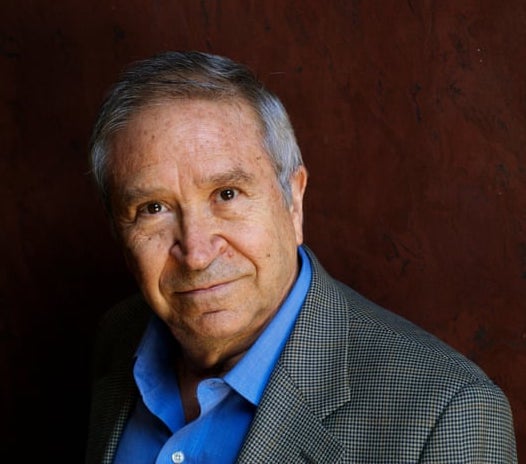
Homero Aridjis
Seven candidates stood for the presidency from Europe, Africa and the Americas though one dropped out. Homero Aridjis of Mexico, well-known poet, journalist and diplomat, was elected the next President of International PEN.
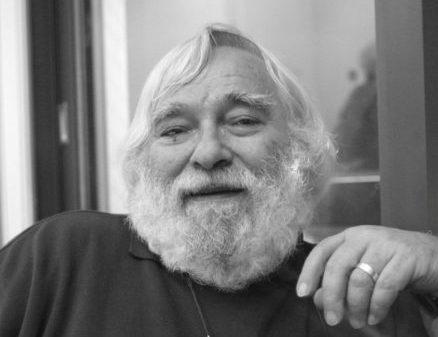
Moris Farhi
Novelist Moris Farhi, former chair of English PEN’s Writers in Prison Committee, was elected chair of the WiPC. The two runner-ups Louise Gareau-Des Bois (Quebec PEN) and Marian Botsford Fraser (PEN Canada) agreed to serve for a year as Vice Chairs. In 2009 Marian Botsford Fraser was elected chair of WiPC and served till 2015.
The new Ad Hoc Committee elected at the Congress included Marian Botsford Fraser (Canada), Takashi Moriyama (Japan), Boris Novak (Slovenia), Carles Torner (Catalonia), Jacob Gammelgaard (Denmark), Vincent Magombe (Africa Writers Abroad), Gloria Guardia (Colombia), Gordon McLauchlan (New Zealand) and Monika van Paemel (Belgium). This committee was charged with considering all the restructuring proposals and preparing a draft for discussion and adoption by the Assembly of /Delegates at the 1998 Helsinki Congress. The Ad Hoc Committee was also tasked as a Nominating Committee to search for a new International Secretary. Alexander Blokh, re-elected for another year as International Secretary, planned to step down at the 1998 Helsinki Congress. Little did I know nor aspire to take on that role six years later.
New PEN Centers voted in at the Edinburgh Congress included Cuban Writers in Exile, Somali-speaking Center, Sardinian PEN Center, and a reconstituted Mexican PEN Center.

PEN International’s Writer in Prison Centre to Centre newsletter, July, 1997
Next Installment: PEN Journey 21: Helsinki–PEN Reshapes Itself
PEN Journey 18: Picasso Club and Other Transitions in Guadalajara
PEN International celebrates its Centenary in 2021. I’ve been active in PEN for more than 30 years in various positions and now as an International Vice President Emeritus. With memories stirring and file drawers of documents and correspondence bulging, I am a bit of a walking archive and have been asked by PEN International to write down memories. I hope this personal PEN journey will be of interest.
PEN perches on a three-legged stool. One leg is literature—the work of writers around the world. The other leg is freedom of expression—the defense of writers, particularly those in authoritarian regimes. The third leg is community—the fellowship among writers from over 100 countries sharing, appreciating, translating. PEN began as a loose network of clubs after World War I and grew quickly. The governance of the organization has evolved and at times set the three legs of the stool at odd angles to each other. One such occasion was at the Guadalajara Congress in 1996 as PEN celebrated its 75th anniversary.
My file for that Congress, whose theme was “Literature and Democracy,” bulges with documents and papers and programs in duplicates and triplicates. I don’t know why it is so much larger than the other files. In retrospect, the 1996 Congress was an inflection point, a turn in the road. Maybe I was collecting evidence.

Program from PEN International 63rd Congress in Guadalajara, Mexico
At the Congress I was handing over the reins of the Writers in Prison Committee (WiPC), having finished my term, at least that was my intent. Ronald Harwood was doing the same as President of PEN International, at least that was his intent. Elizabeth Paterson was retiring after 28 years as Administrative Secretary of PEN, and WiPC researcher Mandy Garner was also moving on. PEN was navigating transitions, some planned, but others with a momentum of their own.
For the global context of that time, I reported as Chair of WiPC to the Congress:
“…two political phenomena have emerged, both perhaps linked to the end of the Cold War. First, we have seen conflicts erupting not so much between nations as within nations. This phenomenon, though not new, has offered particular challenges for the writer. Dozens of writers have been killed in conflicts in Algeria, Bosnia, Rwanda, Chechnya. In a number of counties with internal conflicts, including Peru, India, and Turkey, governments have used Anti-Terror Laws to arrest writers who write about the opposing parties.
“Another phenomenon is the increasing number of countries turning to the democratic process for government. The end of the Cold War saw the fall of many totalitarian regimes. Since 1990 over 50 countries have, at least on paper, turned to democracy to select their governments. However, democracy has not always settled so easily into place. One of the indispensable elements of a working democracy is freedom of expression, and this freedom has often been curtailed. Because PEN’s mandate is to protect the free flow of ideas and the freedom of writers to write, to criticize and to protest, PEN’s mission is as compelling today with newly emerging democracies as it was during the Cold War era. In country after country—from Albania, Algeria, Azerbaijan, Cambodia, Cote d’Ivoire, Croatia, Egypt, Ethiopia, Romania, Tajikistan, Zambia—writers can be and have been arrested on such charges as “disseminating false propaganda,” “insulting the President,” and “publishing false news.” The Writers in Prison Committee’s protests and work for these writers is fundamental in a larger political process that is unfolding…
“…Whenever one might feel despair for the way human beings can treat one another, the despair can be lifted by noting the caring of the writers who work for each other. The members of the new Ghana PEN have adopted a writer in Peru; Mexican members and Swedish members work for Turkish writers; Polish, Slovak, Nepalese, French and many other members work on behalf of imprisoned Vietnamese writers. Canadian writers are working on behalf of their Nigerian colleagues, an American writer writes in Portuguese to an Indonesian imprisoned writer; English and German writers have been in long-term correspondence with an imprisoned writer in South Korea. Danish writers are working for an imprisoned writer in Yemen; Norwegian, Finish, Austrian and Czech writers are protesting on behalf of Chinese writers; Australian and Catalan writers work for imprisoned colleagues in Myanmar/Burma…”
These corridors of concern linked men and women around the world in defense of each other and of freedom of expression. The Writers in Prison Committee was a place everyone came together to focus on PEN’s mission. Discussion on resolutions and actions began there and were taken to the full Assembly of Delegates.
That year resolutions passed and action was taken on cases in: Algeria where seven writers had been killed and many more threatened and arrested; the Dominican Republic where intolerance was growing and a writer had disappeared; Turkey where 50 writers were imprisoned and 100 others sentenced to prison; Indonesia where writers had been arrested and imprisoned and the famed writer Pramoedya Ananta Toer was under town-arrest and where in East Timor writers had been killed and leader and poet Alexandre (Xanana Gusmao) was in prison and sentenced to death; Iran where writers were disappeared, tortured and imprisoned; Central Asian Republics, particularly Tajikistan, where at least 29 journalists had been murdered in the last four years; China where dozens of writers were serving long prison sentences or were sentenced to re-education camps; Cuba where journalists were imprisoned and harassed; Mexico where journalists were killed, disappeared and threatened; Vietnam where writers were serving lengthy prison terms; and Nigeria where Ken Saro Wiwa had been hanged the year before and other writers were in prison.

Writers in Prison Committee at Guadalajara Congress, 1996. L to R: Alexander Tkachenko (Russian PEN), Joanne Leedom-Ackerman (WiPC Chair), Mandy Garner (WiPC researcher)
At the WiPC meeting there was a report on PEN’s quiet mission to Cuba where writers were hoping the system would open up after the global changes in 1989. Writers there said they were in a goldfish bowl but never sure how big the bowl was from day to day, and those arrested often faced a choice between long prison sentences and exile. The WiPC meeting also heard from the sister of Myrna Mack, a Guatemalan anthropologist who had been killed and was one of the significant leaders of the worldwide movement against impunity. We also launched the anthology This Prison Where I Live of writings from PEN cases over the years.
In addition to the Writers in Prison Committee, the Translation and Linguistic Rights Committee, the Peace Committee and the Women’s Committee met in the early days of the Guadalajara Congress. Literary sessions focused on the Congress theme with programs on Literature of Old and New Democracies and Post-Communist Democracies.
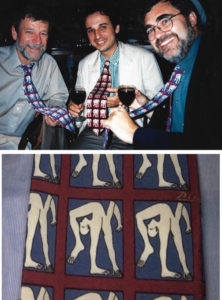
Picasso Club neckties: Top l to r: Michael Scammel (International PEN Vice President), Carles Torner (Catalan PEN), Isidor Consul (Chair PEN Translation and Linguistic Rights Committee)
Also during those first days of the Congress, a group of members were meeting off site to launch a process to reshape the governance of PEN. For as long as anyone could remember, the International Secretary and President had been the sole decision-makers between Congresses where the Assembly of Delegates voted on issues. Many felt this system no longer allowed sufficient democratic expression for a worldwide organization.
I was friends with many of those meeting, but the WiPC staff and I kept out of the off-site gatherings. We felt we needed to keep the WiPC a neutral place where everyone came together. One morning the men in that group entered the Assembly of Delegates all wearing the same Picasso print necktie, “a figure twisted like a pretzel,” one member described later, ties bought at the Picasso restaurant where they had met. The group had felt shut out of discussions, and now were coming forward together. It was like a declaration of revolution. “For heaven sakes, take off the ties!” I recall someone saying, and the ties gradually were folded into pockets, but a revolution had begun.
Two Spontaneous Resolutions were introduced to the Assembly:
Spontaneous Resolution 1 On PEN’s Structure Submitted by the Swedish Centre, seconded by the Canadian Centre, and supported by the American, Bangladeshi, Catalan, Danish, Finnish, Japanese, Kenyan, Melbourne, Nepalese, Norwegian, San Miguel de Allende, Slovakian, Swiss German and USA West Centers.
Resolutions II on P.E.N’s Structure, submitted by the same centres.
“Taking into consideration the debate on P.E.N.’s composition, development and structure, held in Guadalajara on Sunday, November 10th, 1996, on the occasion of P.E.N.’s 75th anniversary;
Convinced of the need to enhance its democratic structure and facilitate wider international participation;
Resolves to request one P.E.N. Centre to elaborate the draft of a revised version of the current regulations, in cooperation and consultation with all the other Centres, as well as the International President and Secretary….”
After discussion and debate, it was agreed that PEN centers should send their suggestions for reform of the Constitution to the Japanese Centre, and Japanese PEN would coordinate and forward them to the International Headquarters and to all Centres so that the Centres could consider and vote on them at the 1997 Edinburgh Congress. One of these proposals, which was presented in Guadalajara by the Spanish-speaking Centres, was that Spanish should be made the third official language of PEN if financing could be raised.

Delegates at Writers in Prison Committee meeting PEN 63rd Congress in Guadalajara, 1996
PEN had its own democratic elections on the Congress agenda with a vote for the new International President. There was only one candidate put forward by the International Secretary and his PEN Center, a respected poet from Romania, a woman, who would have been the first woman President of PEN. She herself had lived under a repressive regime, but she had not been very involved in the international organization, and she had not been part of the discussion to reform PEN’s governance. When she spoke to the issue, questioning the need and the process, there was in the lunch conversations and in the corridors afterwards, pushback and a questioning of her suitability as President.
The next morning she withdrew her candidature. She said that it had become clear that the organization was undergoing a transformation and she felt she was the wrong person to be president at such a time of change. It seemed to her that PEN was in process of being transformed from an organization of writers into something less. She had been motivated by her dream of PEN, not as an organization with bureaucratic structures and competing pressure groups, but as a place where the writers of the world came together. She was a writer from Eastern Europe who had had great problems under successive dictatorships. From this perspective she had had an image of PEN as something extraordinary. It was true that she had confused PEN with the Writers in Prison Committee, she said. It was PEN which had spoken out when she was forbidden to publish. The work of the Writers in Prison Committee remained very important to her. What troubled her was the discovery of pressure groups who appeared to be fighting for a power which in her eyes had no existence. The only power which writers possessed was the power of their books and the fear of those in power that the truth told in those books would outlive their tyrannies.
Many members applauded her withdrawal speech. It articulated the pressure and tension in the 75-year-old organization which lived on ideals but also had to increasingly function in the competitive world of nongovernmental organizations with budgets and boards and democratic processes, an organization that needed to calibrate, modernize and keep all its members engaged.
Ronald Harwood agreed to serve another year as President. The International Secretary was reelected. Some members noted quietly that regulations required he face election every year now because of his age.
My replacement as Chair of the Writers in Prison Committee was unanimously elected. The former President of Danish PEN, Niels Barfoed was a respected writer and longtime PEN member, who as a young boy had circumvented the Nazis as a courier with banned literature from his older brother who was in the Resistance. The WiPC had chosen a nominating committee to assure qualified candidate(s) were nominated. I left Guadalajara satisfied that the new WiPC process had come up with such a well-qualified Chair. I commiserated with Ronnie, thanking him for taking on another term though it meant his own writing would be curtailed. I was elected as a Vice President of PEN International and left Guadalajara happy to be returning to my own work. However, a few months later Niels fell ill and resigned, and I too was back as Chair of the Writers in Prison Committee. Ronnie and I served a fourth year together.
At the end of the Congress, I went to the airport with Alexandre Blokh, the longtime International Secretary. It had been a difficult Congress for him. He questioned whether he had stayed on too long. At the Edinburgh Congress in 1997 new governance and regulations were proposed, and at the 1998 Congress in Helsinki Alex stepped down after 16 years. PEN International was on its way to having an international board and more democratic governance which presented its own challenges as the organization proceeded towards the 21st Century.
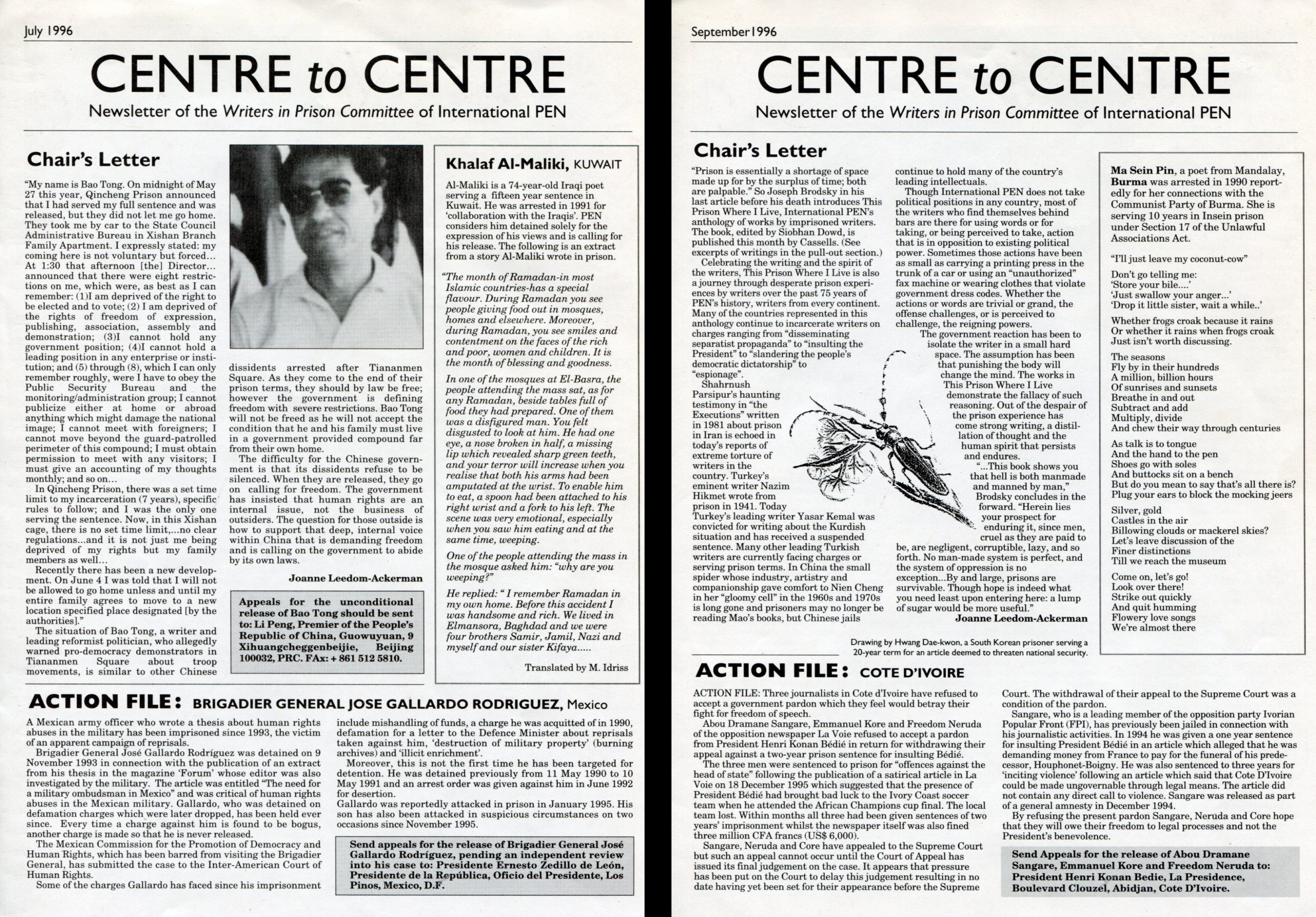
PEN International Writers in Prison Committee bimonthly newsletter, July and September, 1996
Next Installment: PEN Journey 19: Prison, Police and Courts in Turkey—Freedom of Expression Initiative
PEN Journey 17: Gathering in Helsingør
PEN International celebrates its Centenary in 2021. I’ve been active in PEN for more than 30 years in various positions and now as an International Vice President Emeritus. With memories stirring and file drawers of documents and correspondence bulging, I am a bit of a walking archive and have been asked by PEN International to write down memories. I hope this personal PEN journey will be of interest.
What I remember most about the gathering of colleagues from 28 countries—31 PEN centers—51 of us in all at the first Writers in Prison Committee conference in 1996 was the seriousness of purpose and intellect during the day and the fun and talent in the evenings.
Hosted by Danish PEN, writers from every continent gathered at a university in Helsingør—known in English as Elsinore, the home of Shakespeare’s Hamlet—where we met in workshops and ensemble during the day to shape and refine our work on behalf of writers and freedom of expression around the world. But in the evening we were at a small university in a small city without transportation or distraction so we entertained ourselves. Each delegate displayed talents—from poetry reading to song to dance to musical performances.
As Chair of the WiPC gathering, I’d brought none of my own writing to read and was left to exhibit meager other talent which consisted of playing a few opening bars of Für Elise on the piano and whistling tunes with my far more talented Danish and Russian colleagues. Archana Singh Karki from Nepal in flowing red dress entertained with her graceful dance; Siobhan Dowd, our Irish former WiPC director and Freedom of Expression director at American PEN, silenced us with her soulful Irish folk songs, sung acapella; Sascha, Russian PEN’s General Secretary, not only whistled robustly but recited his poetry, which I was told I should be glad I didn’t understand with its bawdy content; Sam Mbure from Kenya and Turkish/English novelist Moris Farhi also read and recited work. PEN International President Ronald Harwood joined the discussions in the day and was audience in the evening. I don’t recall if Ronnie offered his own work, but we all bonded in our mission and in our support for the talent in the room.
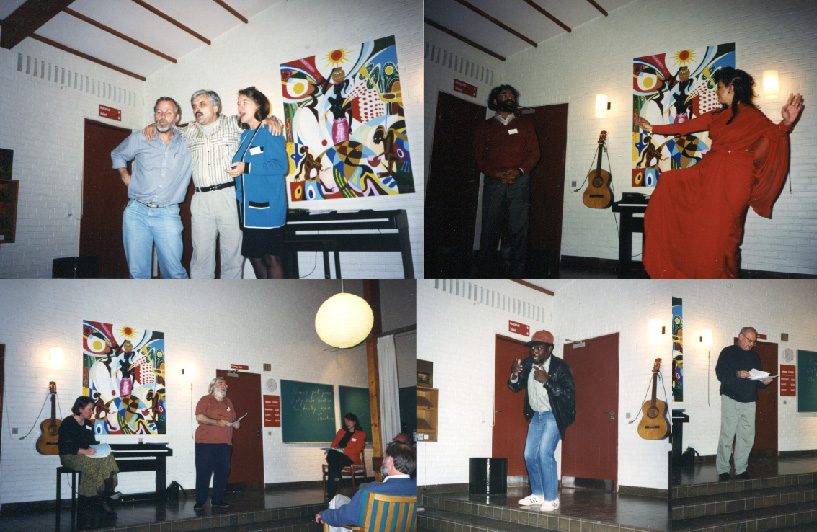
Entertainment in the evening: From the top left—Jens Lohman (Danish PEN), Alexander (Sascha) Tkachenko (Russian PEN), Joanne Leedom-Ackerman (Chair of WiPC)in a whistling song; Rajvinder Singh (German PEN, East) accompanying Archana Singh Karki (Nepal PEN) in dance; Siobhan Dowd (at piano—English & American PEN) with Moris Farhi (reading—English PEN); Sam Mbure (reciting—Kenyan PEN); Niels Barfoed (reading—Danish PEN)
During the three days, we fine-tuned our methods of working on and campaigning for our main cases, those writers who were imprisoned, attacked or threatened because of their writing, often their nonviolent voice of protest against authoritarian regimes. We considered PEN’s decision-making on borderline cases such as those which included drug charges, advocacy of violence, pornography, hate speech, terrorism. These were not categories we normally took on as cases. We discussed when we might take up such a case or assign them to investigation or judicial concern. We laid the groundwork for more joint actions among centers and other organizations such as the U.N., OSCE and IFEX, the International Freedom of Expression Exchange.

Round Table of the WiPC conference which included delegates from PEN centers in Switzerland, Jerusalem, Denmark, England, Mexico, Portugal, America, Norway, Czech Republic, Ghana, Canada, Australia (Melbourne and Sydney), Portugal, Finland, Nepal, Scotland, Malawi, Kenya, Ghana, Croatia, Slovakia, Sweden, Spain, Austria, Japan, Germany, Russia, Poland, Netherlands
With PEN’s WiPC staff Sara Whyatt and Mandy Garner, we set out a campaign calendar for the year, beginning with Turkey in May; China in June; Myanmar in July; Guatemala in September; Vietnam in October; Nigeria in November; Human Rights Day focus in December; Cuba in January; Rushdie and Fatwa and Iran in February; United Nations Commission on Human Rights lobbying in February/March and a return to China during the Chinese New Year in February/March; International Women’s Day in March and World Press Freedom Day in May. This campaign calendar meant that the London office would send information each month related to these foci, and PEN centers would plan programs if the campaign fit their work and the cases they had taken on.
We discussed the elements of successful missions to troubled areas and what future missions should be considered. In 1997 PEN International and Danish PEN sent representatives on a quiet mission to Cuba. We also strategized on the effect of writers observing trials in certain countries, particularly in Turkey.
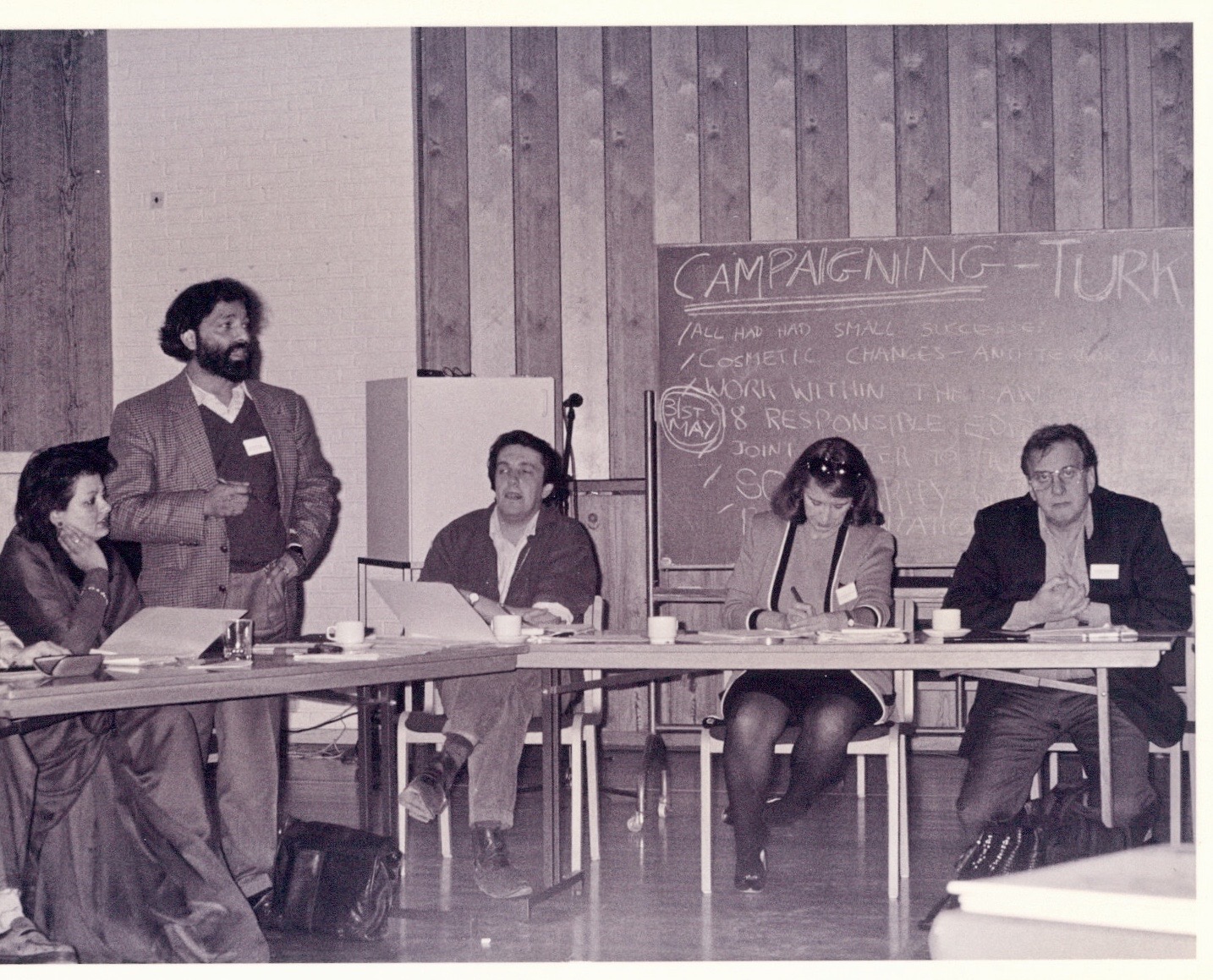
Working session on Turkey Campaign at at WiPC conference: L to R: Archana Singh Karki (Nepal PEN), Rajvinder Singh (German PEN, East), Robin Jones (WIPC staff), Joanne Leedom-Ackerman (WiPC Chair), Ronald Harwood (PEN International President)
During the conference a request came for members of PEN to sign on individually and en mass as publishers of a book in Turkey which republished an article by the famed Turkish novelist Yaşar Kemal, along with articles by other Turkish writers who were in prison because of their writing. Kemal had recently been charged because of an article he’d published in the German magazine Der Spiegel about the Kurds. The organizer in Turkey had gathered hundreds of Turkish writers, publishers, artists, and actors to sign on as publishers. They wanted to present the book and the list of hundreds of publishers to challenge the courts to bring charges against everyone. Many of us agreed to participate. This act launched a campaign in Turkey and a mission later in 1997. (Blog to come.) The independent Turkish Freedom of Expression Initiative has since gathered biennially for the last 23 years. For this kind of joint action PEN was primed to cooperate.
Finally in Helsingør the Writers in Prison Committee took a step towards opening up the election process for the WiPC Chair. My term was due to expire at the fall 1996 Congress in Guadalajara. We decided to select a nominating committee from members to find candidate(s) for the next chair rather than have the post appointed by the Secretariat in London. That process was later replicated in other elections in PEN and is standard procedure today.

Workshop: From left includes: Neils Barfoed (Danish PEN), Lady Diamond (Ghana PEN), Moris Farhi (English PEN), Sara Whyatt (WiPC Programme Director), Mandy Garner (WiPC researcher), Joanne Leedom-Ackerman (WiPC Chair at front)
Helsingør was a fitting venue for the first WiPC Conference, not only because of its literary credentials with the Kronborg Castle where most of Shakespeare’s Hamlet takes place, but also because of its historic legacy in World War II. Helsingør was one of the most important transport points for the rescue of Denmark’s Jews. A few days before Hitler had ordered that the Danish Jews were to be arrested and deported to concentration camps October 2, 1943, one of the Nazi diplomatic attaches who’d received word in advance shared the information with the Jewish community leaders. Using the name Elsinore Sewing Club, the Jewish leaders communicated with the population, and the Danes moved the Jews away from Copenhagen to Helsingør, just two miles across the straights to neutral Sweden. The Danish citizens hid their fellow Jewish citizens until they could get onto fishing boats, pleasure boats and ferry boats and escape over a period of three nights. The Danes managed to smuggle the majority of its Jewish citizens—over 7200 Jews and 680 non-Jews—across the water to safety.
Next Installment: PEN Journey 18: Picasso Club and Other Transitions in Guadalajara
PEN Journey 16: The Universal, the Relative and the Changing PEN
PEN International celebrates its Centenary in 2021. I’ve been active in PEN for more than 30 years in various positions and now as an International Vice President Emeritus. With memories stirring and file drawers of documents and correspondence bulging, I am a bit of a walking archive and have been asked by PEN International to write down memories. I hope this personal PEN journey will be of interest.
Fremantle, Australia is far away, at least if you live in the Americas or Europe or West Africa. So is Tokyo, Manila, Nepal, Hong Kong,—all destinations of PEN Congresses and conferences. As a global organization with centers in over 100 countries, PEN tries to cover the world with its meetings and at least once or twice a decade organize a Congress in Asia or Australia with its centers there.
 In 1995 for PEN International’s 62nd Congress Perth PEN hosted delegates from around the world in Fremantle, a port city on Australia’s western coast in the Perth metropolitan area, a picturesque city with Victorian architecture and, as I recall at the time, a town out of the 1960’s where time hadn’t quite caught up. The city’s reputation was partially derived from its history as a penal colony from the 1850’s to 1991. The traditional Aboriginal people who lived there called the area Walyalup “the crying place.”
In 1995 for PEN International’s 62nd Congress Perth PEN hosted delegates from around the world in Fremantle, a port city on Australia’s western coast in the Perth metropolitan area, a picturesque city with Victorian architecture and, as I recall at the time, a town out of the 1960’s where time hadn’t quite caught up. The city’s reputation was partially derived from its history as a penal colony from the 1850’s to 1991. The traditional Aboriginal people who lived there called the area Walyalup “the crying place.”
The 65th Congress was one of the smaller for PEN, less formal with many delegates staying in the homes of local writers rather than in a hotel. Instead of formal receptions in houses of state, at least one evening’s entertainment was a game of literary trivia and bingo. Because the venue was on the harbor, the swimmers among the delegates, particularly Sascha (Alexander Tkachenko) General Secretary of Russian PEN, tried to swim each day despite the warnings that waters were shark-infested. Sascha defied the sharks which he considered a milder threat than what he was dealing with back home in Russia.
The Congress theme Freedom of Expression and Cultural Context translated into an endorsement of the universality of human rights as expressed in the Universal Declaration of Human Rights. Held in the 50th anniversary year of the United Nations’ founding, PEN insisted human rights were not a relative notion. “While the concept of a universal right may not have penetrated the mechanisms of all states, the invocation of the universal right to free expression remains one of the essential tools that PEN and other organizations use to apply pressure and insert a wedge into the conscience of nations,” the Writers in Prison Chair’s report noted that year.
While certain human rights were absolute, governance was relative, and PEN itself was beginning to struggle with its structure. The relaxed atmosphere of Fremantle allowed informal discussions among delegates who were urging a more democratic structure for PEN. As PEN International headed towards its 75th anniversary the following year, Boris Novak, Slovene PEN President and Chair of the Peace Committee noted that the inner structure of PEN was no longer adequate for the needs of such a large global organization. This sentiment was echoed by the American PEN delegate and delegates from Scandinavian centers. The International Secretary agreed to hold a special meeting in Perth on this question, and the discussion and the dissent began.
As chair of the Writers in Prison Committee, I shared the concerns, but the WiPC staff and I determined that the Writers in Prison Committee should remain a place where everyone came together and focused on the mission of getting writers out of prison and securing freedom of expression so we stayed on the edge of the debate. The internal politics of PEN were stirring and erupted a year later at the 1996 Congress in Guadalajara. In Perth, however, the breezes were balmy and the water warm enough to dip in if not to cross the distance between the old and the new. That process would evolve over the next several years and Congresses to come.

Brief summary of work follows in this excerpt from my 1995 Writers in Prison Committee Chair report:
“Since [he] was arrested, my relatives and close friends have not dared to speak to me or telephone me for fear of being arrested. They have steered clear of me. I can count on the fingers of one hand the number of friends and relatives who have stood by me. Since our problems began, I have had to rely on my family and our friends from abroad…I am very grateful to them…In short, your support will not only help my family, but also the families of others who are in distress. We will never forget your help.”
—Letter to PEN WiPC from the wife of an imprisoned writer who for reasons of security must remain anonymous.
“The work of the Writers in Prison Committee this year has included appeals on writers’ behalf to 59 countries, around 150 appeals from the London office and hundreds more from centers around the world who responded to PEN’s Rapid Action calls and to the specific cases of the prisoners they have adopted…
“The fiftieth anniversary of the end of World War II saw celebrations in Europe but also saw a resurgence in racist and hate literature and speech. Anti-fascists writers found themselves threatened, especially in Austria where one writer was almost murdered. Turkey continued to be the most difficult country in the region with over 200 arrests, brief detentions, killings and disappearances, almost all relating to writings on the Kurdish situation…
“The other issues to watch—the rise of militant fundamentalism, terrorism, separatist movements—but these are generally issues over which PEN has little control even though they affect the fates of individual writers…
“Progress this year can best be measured in the releases of prisoners and also by the changes in certain countries’ laws. The Writers in Prison Committee lobbied governments and international bodies on general issues such as the death penalty, long term imprisonment and anti-terror laws and has seen some effect. PEN, along with other human rights organizations, urged the Indian government to reform or abandon its anti-terrorist law under which writers were detained, and recently the government has voted not to renew the law. The WiPC has also spent a large effort speaking with representatives of the Turkish government at embassies and at the United Nations to urge the amendment or abolishment of Article 8 of the Anti-Terror Law. Just last week the Goverment finally announced its plan to amend the law. We are hopeful this will soon take place in such a way that hundreds of writers detained because of Article 8 will no longer face prison terms, though we are cautious in our optimism.
“The main substance of the Writers in Prison Committee work, however, is not shown in the statistics nor through the reformed government policy, but can best be measured in the lives of individual writers. This year over 90 writers have been released from prison and some individuals facing severe penalties, including death, have instead received clemency. Unfortunately in many countries as one writer walks out of prison, another is being brought in…
“Turkish writer Esber Yagmurdereli, who is blind, recently had his 20-month prison sentence ratified. He was arrested for a speech about the Kurdish situation at a human rights meeting just weeks after his release from 13 years in prison. [I’d like to end with] an excerpt from one of his plays, “Crossing Boundaries” which deals with the experience of a political prisoner:
The moment lost all sense of time and the door opened
You were leaving…the anguish would lift from your heart
…Your unconquered eyes would be mine from now on.
…You went and waking to your absence was to be condemned to a harsh fate
And I felt the damnation again when I heard my forehead crack against these silent walls
…Suddenly I was without a country like so many Palestinians
I even forgot my language: I forgot I was a scream in the river of your voice
(Didn’t we force these walls to memorize our voices
Didn’t we breastfeed these rotten cells our best folk songs?)
We set alight wet stones as we rested our backs against them…
…I kept biting my lips, but never forgot the memory…
And as the moon fell into the night, I saw your smile in its eternal beauty
The rainbow shone on your forehead and its greeting was a declaration
…then that moment lost all sense of time and the door opened
The silenced suddenly arose and spirits soared like rain-birds.”
Next Installment: PEN Journey 17: Gathering in Helsingør
PEN Journey 15: Speaking Out: Death and Life
PEN International celebrates its Centenary in 2021. I’ve been active in PEN for more than 30 years in various positions and now as an International Vice President Emeritus. With memories stirring and file drawers of documents and correspondence bulging, I am a bit of a walking archive and have been asked by PEN International to write down memories. I hope this personal PEN journey might be of interest.
As I wrote holiday cards for the prisoners on PEN’s list this year, I recalled the many cases of writers PEN has worked for over the decades—the successes when writers were released early from prison and the sorrow when they did not survive. The path back for a writer imprisoned for his work is rarely easy, at times has led to exile, but often is accompanied by a mailbag full of cards and letters from fellow writers around the world.
I also sat with PEN’s Centre to Centre newsletters spread around me from 1994-1997, the years I chaired PEN International’s Writers in Prison Committee (WiPC). During that period if a country was mentioned, I knew whether writers were imprisoned there and often knew the main cases as did PEN’s researchers. At the time we published twice a year PEN’s list with brief descriptions of the cases. Proofing paragraph after paragraph of hundreds of situations, I would know without looking when I had moved from one country to another by the punishments given. Lengthy prison terms up to 20 years to life meant I was reading cases from China, but if the writers were suddenly killed either by government or others, I’d moved on to Columbia. In Turkey were pages and pages of arbitrary detentions and investigations and writers rotating in and out of prison.
Names from this period are a kind of ghost family for me, evoking people and a time and place: Taslima Nasrin, Fikret Başkaya, Mohamed Nasheed, Gao Yu, Bao Tong, Hwang Dae-Kwon, Myrna Mack, Ma Thida, Yndamiro Restano, Mansur Rajih, Luis Grave de Peralta, Brigadier General José Gallardo Rodríguez, Koigi wa Wamwere, Eskinder Nega, Tefera Asmare, Liao Yiwu, Ferhat Tepe, Dr. Haluk Gerger, Ayşe Nur Zarakolu, Ünsal Öztürk, İsmail Beşikçi, Eşber Yağmurdereli, Mumia Abu-Jamal, Đoàn Viết Hoạt, Nguyễn Văn Thuận, Balqis Hafez Fadhil, Tong Yi, Christine Anyanwu, Tahar Djaout, Aung San Suu Kyi, Yaşar Kemal, Alexander Nikitin, Faraj Sarkohi, Ali Sa’idi Sirjani, Wei Jingsheng, Chen Ziming, Slavamir Adamovich, Bülent Balta, and many more. Many are now released, a few are even working with PEN, a number have deceased and two of the most celebrated and tragic—Liu Xiaobo and Ken Saro-Wiwa—were executed, one left to die in prison, the other hung.
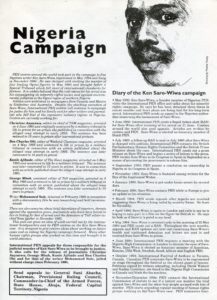
Page 1 of PEN International’s campaign for Ken Saro-Wiwa 1994-1996
In their cases, no amount of mail or faxes or later emails or personal meetings with ambassadors and diplomats changed the course for these writers. A year before Ken Saro-Wiwa’s death, noted Iranian novelist Ali Sa’idi Sirjani died in prison. And years later the murder of Anna Politkovskaya in Russia and the murder of Hrant Dink in Turkey and in 2017 the death in prison of Chinese poet and Nobel laureate Liu Xiaobo all stand out as main cases where PEN and others organized globally but were unable to change the course. I’ll address the case of Liu Xiaobo in a subsequent blog. He was also in prison during the 1990’s but was not yet the global name and force he became.
One of the most noted of PEN’s cases in the mid 1990s was Nigerian writer and activist Ken Saro-Wiwa who was hanged November 10, 1995. Ken understood they would hang him, but PEN members did not accept this. Ken was an award-winning playwright, television producer and environmental activist who took on the government of Nigerian President Sani Abacha and Shell Oil on behalf of the Ogoni people whose land was rich in oil and also in pollution and whose people received little of the profits.
I was living in London when Ken Saro-Wiwa, who had been arrested before for his writing and activism, visited PEN and other organizations in support of the Ogoni cause. PEN took no position on political causes but campaigned for his freedom to write and speak without threat. He met at length with PEN’s researcher Mandy Garner, providing her books and documentation of how he was being harassed in case he was arrested again. When he returned to Nigeria, he was arrested again and imprisoned in May 1994, along with eight others, and charged with masterminding the murder of Ogoni chiefs who were killed in a crowd at a pro-government meeting. The charge carried the death penalty.
PEN mobilized quickly and stayed in close contact with his family. Mandy worked tirelessly on the case, gathering and coordinating information and actions. Ken Saro-Wiwa was an honorary member of PEN centers in the US, England, Canada, Kenya, South Africa, Netherlands, and Sweden so these centers were particularly active, contacting their diplomats and government officials. At PEN International we met with members of the Nigeria High Commission; novelist William Boyd joined the delegation. “I remember sitting opposite all these guys in sunglasses wearing Rolex watches, spouting the government line,” Mandy recalls. We also talked with ambassadors, including from England, the US and Norway to encourage their petitioning of the Abacha government. We met with Shell Oil officials to ask that they intervene to save Ken Saro-Wiwa’s life. PEN USA West also had lengthy meetings and negotiations with Shell Oil. PEN International and English PEN set up meetings in the British Parliament where celebrated writers spoke. English PEN mounted candlelight vigils outside the Nigerian High Commission which writers including Wole Soyinka, Ben Okri, Harold Pinter, Margaret Drabble and International PEN President Ronald Harwood attended. A theater event in London featured Nigerian actors acting out extracts from Ken’s plays and also reading poems from other writers in prison. Taslima Nasreen spoke as well. Ken’s writing was made available to the press which covered the story widely.
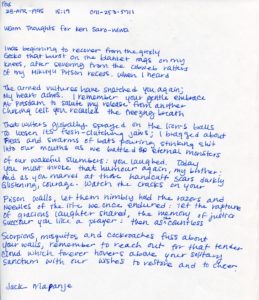
Poem from Malawian poet Jack Mapanje to Ken Saro-Wiwa published on page 2 of PEN Campaign document above
The activity in London mirrored activity at PEN’s more than 100 centers around the globe, from New Zealand to Norway, from Malawi to Mexico. From every continent signed petitions were faxed to the Nigerian government of General Sani Abacha and to the writers’ own governments, to members of Commonwealth nations, to the European Union, the United Nations and to the press calling for clemency for Ken Saro-Wiwa. Through the International Freedom of Expression Exchange (IFEX) of which PEN International was a founding member, the word spread to freedom of expression organizations worldwide. Other human rights organizations including Amnesty and Greenpeace also protested. No one wanted to believe in the face of such an international outcry that the generals in Nigeria, particularly Nigeria’s President Sani Abacha, would kill Ken Saro-Wiwa.
Ken managed to get word out that he was tortured and held in leg irons for long periods of time. He wrote to Mandy, “A year is gone since I was rudely roused from my bed and clamped into detention. Sixty-five days in chains, many weeks of starvation, months of mental torture and, recently, the rides in steaming, airless Black Maria to appear before a Kangaroo court, dubbed a Special Military Tribunal where the proceedings leave no doubt at all that the judgement has been written in advance. And a sentence of death against which there is no appeal is a certainty.”
I moved from London to Washington, DC in late August 1995. When the death sentence was handed down at the end of October, PEN International launched a petition signed by hundreds of writers from around the globe seeking Saro-Wiwa’s and others’ release. For days I tried to get an appointment with the Nigerian Ambassador in Washington. Finally one morning I received a call that I had been given an appointment; however, I was in New York City that morning. Quickly I got a flight back to Washington. En route I called the former PEN WiPC director Siobhan Dowd, who was then heading the Freedom to Write program at American PEN. I asked her to arrange for a second writer to meet me at the Nigerian Embassy. The person didn’t have to say anything, but I wanted a larger delegation.
When I arrived, I was informed the Ambassador had suddenly been called to the U.N. in New York so I met with the number two and three ministers. As I began setting out PEN’s case on behalf of Saro-Wiwa, another woman slipped into the room and sat without speaking but lending ballast to the meeting. Afterwards she and I had coffee, and I briefed her on the case. For the next 25 years Susan Shreve, one of the founders of the PEN Faulkner Foundation, and I have been friends, a friendship that grew out of this tragic event. A few days later I was standing outside the Nigerian Embassy in a vigil, along with representatives from Amnesty and other organizations, when word was sent out to us that Ken Saro-Wiwa had been hanged that morning in Port Harcourt.
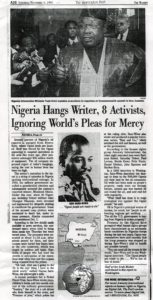
Article from The Washington Post November 11, 1995
The effect of his execution raced through the PEN network and through the human rights and political communities worldwide. The grief was communal. Those who worked on Ken’s case can relate to this day where they were when they heard the news of the execution. The shock was also political. Boycotts were launched against Nigeria. Archbishop Desmond Tutu appeared at a benefit in London for Ken Saro-Wiwa and reported outrage in South Africa over the executions of Saro-Wiwa and the others. He said South African President Nelson Mandela was heading up a campaign to urge the world, especially the US and Western governments to take action. Nigeria was suspended from the British Commonwealth for three years.
Ken’s brother quickly left Nigeria and went to London for a period, sheltering temporarily with British novelist Doris Lessing then relocated in Canada for a time. Ken Saro-Wiwa’s son, Ken Saro-Wiwa Jr., a journalist, also settled in Canada, then in London, then returned and worked for a period in the Nigerian government of Goodluck Jonathan as a special assistant on civil society and international media. He died suddenly in London at age 47 in 2016.
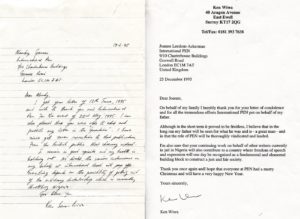
Letter on left from Ken Saro-Wiwa to PEN researcher Mandy Garner. Letter on right from Ken Saro-Wiwa, Jr. to WiPC Chair Joanne Leedom-Ackerman.
The killing of Ken Saro-Wiwa was the beginning of the end for General Sani Abacha, who maneuvered to be the sole presidential candidate in Nigeria’s next election, but died in June, 1998 when he suddenly got ill early one morning and died within two hours, at age 54, the same age as Ken Saro-Wiwa when he was hanged. There were persistent rumors that Abacha had been poisoned, but there was no autopsy and these rumors were never proven.
According to news reports in Lagos, it took five attempts to hang Ken Saro-Wiwa. He was buried by security forces, denying his family the right to bury him. His last words were reported to be: “Lord, take my soul, but the struggle continues.”
Releases of writers PEN worked for that year included Cuban poet Yndamiro Restano freed after serving three years of a ten-year sentence, Cuban journalist Pablo Reyes Martinez freed after three years on an eight-year sentence, Turkish writer Fikret Baskaya freed early and also Unsal Ozturk, freed eight years early, Chinese writer Yang Zhou freed after serving one year of a three-year sentence and Wang Juntao freed after serving five years of a 13-year sentence, Burmese Zargana freed a year early and many others.
“I wish to thank International PEN and the WiPC for all their endeavors on my behalf during the period of my detention. There is no doubt in my mind at all that the powerful insistence and impartial voice of PEN did a lot to win me my freedom from the tyrannical arms of the military dictatorship in Nigeria…”—Ken Saro-Wiwa in fall, 1993 after his earlier detention.
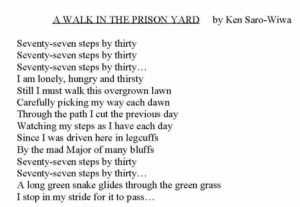
From Ken Saro-Wiwa’s poem “A Walk in the Prison Yard”
Next Installment: PEN Journey 16: The Universal, the Relative and the Changing PEN
PEN Journey 9: The Fraught Roads of Literature
PEN International celebrates its Centenary in 2021. I’ve been active in PEN for more than 30 years in various positions and now as an International Vice President Emeritus. With memories stirring and file drawers of documents and correspondence bulging, I am a bit of a walking archive and have been asked by PEN International to write down memories. I hope this personal PEN journey might be of interest.
Twelve-foot puppets danced outside the dining room’s second floor windows at our hotel, billed as the “oldest hotel in the world,” set on the central plaza of Santiago de Compostela, Spain, the venue for PEN International’s 60th Congress.
Sara Whyatt, coordinator of PEN’s Writers in Prison Committee, and I hurried to finish breakfast and our agenda before we joined the crowds outside at the historic Festival of St. James. That evening International PEN’s 60th Congress would convene. Hosted by Galician PEN, the Congress had as its theme Roads of Literature, which seemed appropriate as pilgrims from around the world also gathered on the Obradoiro Plaza in front of the ancient Cathedral, the destination for their Camino.

Parador Hotel, Santiago de Compostela St. James Festival, Obradoiro Plaza, Santiago de Compostela
At this Congress the presidency of PEN was changing hands as was the chairmanship of the Writers in Prison Committee, which I was taking over from Thomas von Vegesack. Ronald Harwood, the British playwright, was assuming the PEN presidency from Hungarian novelist and essayist György Konrád, who had been a philosophical president, often running the Assembly meetings like a stream of consciousness event where the agenda was a guide but not necessarily a governing map. Ronnie ran the final meeting like a director and dramatist, determined to get the gathering from here to there with a path and deadline. Both smart, experienced writers, committed to PEN’s principles, they had very different styles. Known only to a few of the delegates a surprise visitor was also arriving mid-Congress.
The 60th Congress in September 1993 was a watershed of sorts. It was the first since the controversial Dubrovnik gathering six months before which had split PEN’s membership (see PEN Journey 8) because of the war in the Balkans.
Konrád’s opening speech to the Assembly explained that PEN’s leadership had gone ahead with the congress over the many objections from PEN centers because the venue had been approved earlier by the Assembly and the host center had been unwilling to postpone. He acknowledged the widespread criticism and also the concern that some individuals who fomented the Balkan wars and participated in alleged war crimes were writers who had been members of PEN. He said, “That these men of war also include men of letters, indeed that these latter are well represented, painfully confronts our professional community with the notion of our responsibility for the power of the Word. Nationalist rhetoric led to mass graves here, and there. Mutual killings would not have been on such a scale in the absence of words that called on others to fight or that justified the war.”
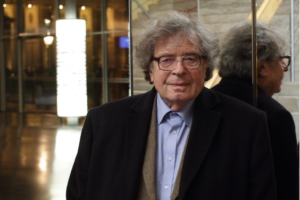
György Konrád, PEN International President 1990-1993, Credit: Gezett/ullstein bild, via Getty Images
Konrád’s address at the opening session went a way in bringing the delegates together. “What we can do is to try and ensure the survival of the spirit of dialogue between the writers of the communities that now confront each other….International PEN stands for universalism and individualism, an insistence on a conversation between literatures that rises above differences of race, nation, creed or class, for that lack of prejudice which allows writers to read writers without identifying them with a community…
“Ours is an optimistic hypothesis: we believe that we can understand each other and that we can come to an understanding in many respects. The existence of communication between nations, and the operation of International PEN confirm this hypothesis…PEN defends the freedom of writers all over the world, that is its essence.”
Ronald Harwood added in his acceptance for the presidency: “The world seems to be fragmenting; PEN must never fragment. We have to do what we can do for our fellow-writers and for literature as a united body; otherwise we perish. And our differences are our strength: our different languages, cultures and literatures are our strength. Nothing gives me more pride than to be part of this organization when I come to a Congress and see the diversity of human beings here and know that we all have at least one thing in common. We write…We are not the United Nations…We cannot solve the world’s problems…Each time we go beyond our remit, which is literature and language and the freedom of expression of writers, we diminish our integrity and damage our credibility…We don’t’ represent governments; we represent ourselves and our Centres…We are here to serve writers and writing and literature, and that is enough…And let us remember and take pleasure in this: that when the words International PEN are uttered they become synonymous with the freedom from fear.”
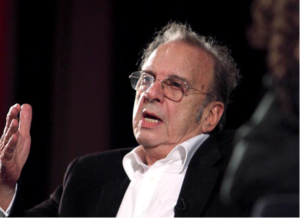
Ronald Harwood, PEN International President 1993-1997. Credit BAFTA
PEN’s work to defend writers and protect space free from fear fell in large part to the Writers in Prison Committee, the largest of PEN’s standing committees with over half the PEN centers operating their own WiP Committees. Members elected the writers who were in prison for their writing as honorary members of their centers, corresponded with them and their families, advocated on their behalf with their own governments and with the governments where the writers lived. PEN’s London office provided the research, selected the cases, planned campaigns and worked with international bodies. The means and methods have modified over the years as the internet and social media have developed, but the focus has remained on the individual writer whose case is pursued until it is resolved. With consultative status at the United Nations, International PEN and its Writers in Prison Committee work through the Human Rights Commission and UNESCO and with other international institutions lobbying on behalf of writers.
At the time of the 60th Congress focus of WiPC’s work included China, Turkey, Algeria, Burma, Syria and Nigeria. In Turkey that summer an arson attack at an arts festival in Sivas had killed at least 37 people, seven writers and poets. One of the writers at the festival Aziz Nesin was translating Salman Rushdie’s Satanic Verses into Turkish and had started to serialize the book in a newspaper. Nesin’s presence at the festival was said to inflame the local crowds. Though Nesin survived, it was reported he was beaten by the firefighters who saved him, and a subsequent investigation held the Turkish state responsible. China continued to have more WiPC cases than any country except Turkey. The threat of death for writers had intensified in Algeria where Islamic extremists had assassinated six writers, including the novelist and journalist Tahar Djaout. In Nigeria the brief imprisonment and possible sedition charges against writer Ken Saro Wiwa, President of the Nigerian Association of Authors, founding member of Nigerian PEN and leader of the Movement for the Survival of Ogoni People was highlighted after his passport was confiscated. A few years later his situation would inspire a global mobilization by PEN and human rights groups after Saro Wiwa was condemned to death by Nigeria’s de facto President Sani Abacha.
The focus of the 60th Congress remained on the Balkans and on growing religious extremism. PEN’s surprise guest appeared at the Assembly in the middle of the Peace Committee report on the Balkans. That morning delegates had entered through a metal detector and security check, the first and only time in my years at PEN. The day before, the guest was to have slipped into the hotel secretly because of security concerns, but the plaza outside was filled with people who had come to see the arrival not of Salman Rushdie but of singer Julio Iglesias who arrived at the same time. Rushdie was quickly whisked inside. That evening a small group gathered for dinner with Rushdie in a private dining room at the hotel. I remember sitting beside Salman and sharing a dessert with him but have no notes from the dinner and remember only a discussion of PEN’s further campaign on his behalf. At the time the fatwa weighed heavily. Translators and publishers of Rushdie had been killed and attacked.
The next morning Rushdie arrived in the hall during the Peace Committee’s report which took a break for Rushdie’s address. The Assembly passed a resolution again condemning the fatwa and urging Iran to rescind it and urging all PEN Centers to continue lobbying their governments on Rushdie’s behalf and to put the case on the agenda of the International Court of Justice and other multilateral fora.
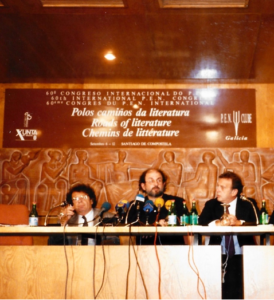
International PEN 60th Congress Assembly of Delegates in Santiago de Compostella 1993. Left to right: György Konrád, Salman Rushdie, Ronald Harwood
To the Assembly Rushdie noted: “…in the Muslim world, in the Arab world when journalists and academics and other visitors ask writers, intellectuals, and other dissident figures in those countries what they think, they repeatedly say: ‘The reason you must defend Rushdie is that by doing so you defend us also.’ For example, Iranian dissident intellectuals, 167 of whom recently signed a very passionate declaration in support of me and of the principles involved in this case, say that the real target of the Khomeini Fatwa and of Iranian state terrorism is not Rushdie, it is them.’ After all I have protection; they don’t. And what the terror campaign means is ‘If we can do this to Rushdie, think how much we can do to you.’”
He said, “There is something I wanted to say about the issue of fear. I do think that a lot of people who mean well and wish to combat this kind of attack are silenced by fear, and think that by remaining silent, somehow things will get better…But the one thing that I’ve learned is that silence is always the biggest mistake, always no matter how great the temptation to silence might be, for a very simple reason. If you are silent, you allow your enemy to speak, and therefore you allow him to set the terms of the debate…I think one of the reasons I’m here is that all of you, and thousands of people around the world have not remained silent.”
Rushdie thanked PEN for its work on his behalf. When asked how this situation affected his writing, he said he’d actually become more optimistic. “I was determined to construct a happy ending and discovered it is very difficult. Happy endings in literature as in life are very difficult to arrange…[but] the answer is that it’s made my writing much more cheerful.”
Rushdie stayed after his address and participated in the discussion on the Balkans. Miloš Mikeln, chair of the Peace Committee, reported that besides help provided to writer refugees and those staying in Sarajevo, the Peace Committee was closely following and analyzing the situation in the war regions, focusing on writers’ involvement in instigating chauvinistic hatred and war propaganda. The most drastic case was that of the Serbian poet from Bosnia, Mr. Radovan Karadzic, who was now the President of the self-proclaimed Serbian Republic of Bosnia. The Peace Committee report noted that he’d used his literary talent and his reputation as a writer to foster ethnic and religious hatred and to promote genocide in Bosnia-Herzegovina. “As writers who deeply believe in freedom of expression we cannot remain silent in the face of such an abuse of the freedom,” Mikeln said. “We find it incumbent upon us to condemn Radovan Karadzic for his violation of all the values that we and International PEN stand for.”
After lengthy debate on whether to name names in resolutions, this condemnation was accepted and taken as a statement of the Writers for Peace Committee. Personal condemnation is highly unusual for PEN, used most notably in the expulsion of Nazi writers in 1933. The debate further focused on the responsibility of PEN members, in particular Serbian PEN members and the Serbian center. It is also very unusual for the PEN Assembly to publicly call out a center. The resolution noted, “Writers in Serbia actively supported chauvinistic propaganda, misusing their influence as writers and thus instigating hatred, destruction and war. These actions including public statements by ___ and _____clearly run against the principles of International PEN. The 60th World Congress…condemns such a blatant abuse of our profession. We expect the Serbian PEN to take a stand against this breach of writers’ ethics as we would expect of any Center confronted by a similar situation.” In this instance the names were included in the original resolution but after debate were left out of the resolution passed by the Assembly.
The Bosnian delegate made a passionate plea protesting what was happening in Bosnia and the characterization of the situation as “civil war” by others. Rushdie said that the delegate from Bosnia was justified and should be heard. Whatever the rights and wrongs of the situation, there was no question that the crimes committed against Bosnia had been the greatest and Sarajevo the most tragic case, Rushdie said, and he hoped the delegate was wrong when he said people outside did not care and did not want to know. The destruction of Sarajevo would haunt Europe for generations, and he added that the people who had wanted to maintain a unified society had been sacrificed, and it was hard not to believe that it was because they were Muslims. Suppose the Serbs had been Muslims. The Bosnian culture was the culture of Europe.
The Assembly of Delegates approved the Peace Committee’s resolution with names removed and also endorsed a recommendation by Russian PEN that was to be annexed to the resolution. That statement declared that PEN “expresses its firm conviction that the duty of writers, and particularly of the writers of those ethnic groups and countries which are directly involved in the armed conflicts is not to espouse national interests but, in the cause of the unity of the world, promote negotiation and compromise so as to obtain the solution of all conflicts.”
PEN Congresses are full of speeches and resolutions, words offered in a world buffeted by much harder power, but PEN members have faith that words matter and can have power for good or ill, that there is a difference between words that aim for truth and words that are used for propaganda. At that time and in times before and since, words have inspired peace but also inflamed towards war. PEN remains a place where words and actions come together in campaigns to preserve the freedom of writers to use their words.
At the 60th PEN Congress in the grand ballroom of the oldest hotel in the world a new Bosnian Center whose members were Serb, Croat and Bosnian was unanimously welcomed as was an ex-Yugoslav Center for writers who no longer lived in the region.
Next Installment: PEN Journey 10: WiPC: Beware of Principles
PEN Journey 5: PEN in London, Early 1990’s
PEN International celebrates its Centenary in 2021. I’ve been active in PEN for more than 30 years in various positions and now as an International Vice President Emeritus. With memories stirring and file drawers of documents and correspondence bulging, I am a walking archive and have been asked by PEN International to write down memories. I hope this personal PEN journey might be of interest.
I moved to London where International PEN is headquartered in January 1990 from Los Angeles. I came with my husband and my 9 and 11-year old sons who rarely wore long sleeves, let alone coats or jackets. A few weeks into our resettlement, London spun in its first major tornado of the decade with hail and winds whipping at hurricane force and cars and trees toppled and a few rooftops airborne. The weather was highly unusual for London. Our family, who was still in temporary housing, took the unwelcome weather as a welcome of sorts, signaling that we might just be in for an adventure. Did you see that roof flying…!
There were still complaints: only four television channels, movies strictly restricted by age and when you did get into a theater, you had assigned seats, milk that went bad in a day, delivered on the stoop in glass bottles, a refrigerator that barely held enough food for a day, appliances that came without plugs…And where was the sun?
Yet the magic of the city quickly affected us all. My youngest son discovered the best skateboarders lived in London, and London (and England) was full of history and castles, and my oldest son, who was soon moved ahead a grade in school because he was highly talented in math, met students from all over the world in his class at the American School, a few of whom talked and imagined in his orbit. He was put on the rugby team to help socialize and the following year on the wrestling team, where he eventually, as an adult and by then dual citizen, wrestled for Great Britain in the Olympics.
For me, finding home in London meant connecting with PEN, both International PEN and English PEN. Writers can be members of more than one PEN center, though can vote with only one center. I’d begun my PEN journey in Los Angeles at PEN Los Angeles Center (changed to PEN USA West). When my second book was published, I also joined PEN American Center, based in New York, and now in London. I joined English PEN, the oldest and the original PEN center since the organization was founded by British writers in 1921. International PEN and English PEN had separate offices, but the Administrative Secretary of International PEN and the General Secretary of English PEN were longtime friends and actually lived next door to each other in Fulham. The two organizations worked independently, yet closely together.
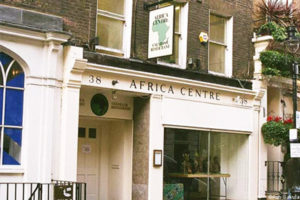
Early on I visited International PEN’s office, headquartered in Covent Garden on King Street in the Africa Centre. To get to the office at the front of the house, you had to go through the Africa Book Shop on the first floor. PEN had two rooms with several desks in the larger room with papers stacked everywhere. There was a filing cabinet and a photocopier and just enough space to squeeze between to get to the desk looking onto the street.
International PEN was kept functioning by the stalwart and efficient Elizabeth Paterson, who I don’t recall getting angry at anyone even as the work piled on and people around the world in PEN centers asked more and more of her, including the smart, demanding International Secretary Alexander Blokh. Alex flew in every month, usually from Paris, and displaced the Writers in Prison Committee’s small staff from the second office in order to conduct the business of PEN around the world. Alex was a former UNESCO official, and at that time UNESCO was one of International PEN’s major funders. When UNESCO was formed, according to Alex, it established organizations for the various arts, but when it came to literature, it recognized that PEN already existed, and so its outreach and funding funneled through PEN. Over the years PEN has grown more and more independent of UNESCO support.
Elizabeth, with her quiet intelligence and subtle humor, managed to keep International PEN running day to day while Alex developed the literary and cultural programs with the centers and the standing committees—the Translation and Linguistic Rights Committee, the Peace Committee, and the Writers in Prison Committee (WiPC). The WiPC tended to operate more autonomously with its elected chair Swedish publisher Thomas von Vegesack and before him Michael Scammell. When I arrived in London, there was also a petite gray-haired woman Kathleen von Simson, a volunteer who’d helped manage the Writers in Prison Committee work for years. PEN had recently hired a paid Coordinator Siobhan Dowd whose task was to professionalize the human rights work, and Siobhan hired researcher Mandy Garner. The two of them worked in the tiny second room. Siobhan eventually crossed the ocean to head up the Freedom to Write program at American PEN.
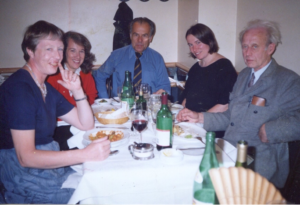
Fall 1990. Left to right: Elizabeth Paterson, Joanne Leedom-Ackerman, Per Wastberg (former PEN International President), Siobhan Dowd, Bill Barazetti
Also finding space on King Street was the Assistant Treasurer (and later International Treasurer) Bill Barazetti, who at that time was an unsung hero from World War II. It was later publicized that Bill had smuggled hundreds of Jewish children out of Prague with false identity papers he arranged. He was a wiry gray-haired former intelligence officer who’d also interrogated captured German pilots. Alex Blokh, whose pen name was Jean Blot, was an exiled Russian Jew, a lawyer and had also been active in the French Resistance during World War II, and Elizabeth had endured the bombings in London during the War. Though it was 1990 and the Berlin Wall and other barriers which had gone up after World War II were now falling, in the PEN office there was still a feeling of that post-War period, an abstemiousness and a fortitude of the dedicated amateur who knew what sacrifice was and endured no matter what. I couldn’t articulate the atmosphere at the time, but as an American born after the war, grown up in Texas and moving to London from Los Angeles, I felt the contrasts and the constraints. One small incident I remember was when a donation for a baby gift for the newly hired Sara Whyatt was being gathered. I offered £20 for the pot and was told by Elizabeth, “Oh, no, that amount would embarrass her.” The concept of anyone being embarrassed by a pooled £20 contribution silenced me. I put in £10 instead, still considered a large amount. Because I was new and an American, I tried to listen and learn, but I understood expectations and horizons were different.
A generation of my own joined the office in the persons of Jane Spender, a former editor, smart and literary who worked with Elizabeth and later Gilly Vincent, who took on the part time assignment to help with development work for the eventual International PEN Foundation. (see PEN Journey 4) Later Gilly became General Secretary of English PEN. I quickly learned to respect the differences; the American way was not the British way. I remember a fundraising event in which there must have been 20 major English writers featured and attending, and the ticket price was £25. The PEN Foundation netted perhaps £3000 that evening. In New York with that line up of writers, I am confident American PEN would have added at least one, if not two, zeros to the proceeds, but we were in London, and the event was not a glittery affair but more like a large family gathering of literary friends at someone’s home.
PEN International moved its offices in 1991 from Covent Garden to Charterhouse Buildings in Clerkenwell nearer the City of London. The new offices were on the top floor of a bonded warehouse, and I never met anyone who didn’t arrive breathless after climbing the steep four or five flights of stairs. There was no elevator, but there was an outside hoist where PEN could load supplies and mail out the window and drop or raise these to and from the ground, preferably not in the rain. Elizabeth set the door code as the beginning and ending years of World Wars I and II, an 8-digit code everyone could remember. The offices at Charterhouse Buildings were spacious compared to King Street—two large airy rooms, one for the Writers in Prison Committee and one for all the other work of PEN, a spacious entry room used as a meeting area and a smaller private office where the International Secretary could work or small meetings could be held. All the rooms were painted “magnolia”–a creamy white/yellow color. The full-time staff by then was, I think, three, along with four or five part-time staff and volunteers, including Jane Spender, Peter Day, editor of PEN International magazine, Bill Barazetti and later his daughter Kathy and occasional interns.
When Siobhan prepared to leave for the U.S., Thomas asked me to interview candidates with him for her replacement. Between interviews he explained to me his view of England in the constellation of Europe by a story of when a fog settled over the English Channel and the headline in a British paper announced: Continent Isolated. Later, when the Channel Tunnel finally connected Great Britain to France in 1994, I sent Thomas a note and a copy of the headline from a British paper: “You’ll be glad to know, Thomas: Continent No Longer Isolated, the headline read.
Thomas and I agreed on the best candidate, and PEN hired Sara Whyatt as the new Program Director of the Writers in Prison Committee. Sara came to PEN from Amnesty and set about further professionalizing WiPC’s research and advocacy work. Sara and Mandy split up the globe, with Mandy focusing on Latin America and Africa.

Across London in Chelsea, English PEN rented offices from the London Sketch Club on Dilke Street where it held weekly literary programs, a monthly formal dinner, an annual Writers Day Program honoring one writer—Arthur Miller, Graham Greene, and Larry McMurtry were three I recall—and a mid-Summer Party. The literary programs and dinners, held in the Sketchers studio and bar, featured writers such as Michael Ignatieff, Germaine Greer, Michael Holroyd, Jan Morris, Rachael Billington, A.L. Barker, Penelope Lively, Andrew Motion, A.S. Byatt, Margaret Foster, William Boyd, Margaret Drabble, Iris Murdoch, and frequently Antonia Fraser, Harold Pinter and Ronald Harwood, just to name a few.
When I moved to London and joined English PEN, the General Secretary Josephine Pullein-Thompson, a stalwart writer/member, managed the organization and kept it running with minimal staff and with active members. Author of young adult novels, Josephine wrote books about young girls and horses. When I close my eyes, I can hear her gruff voice and see her square face and think of horses. She was pragmatic and no-nonsense and what I think of as the epitome of a certain era of British resolve. She befriended me early, I think, because I was focused on a task—getting charitable status for PEN International which ultimately allowed English PEN to claim the same. It was Josephine years later who nominated me as a Vice President of International PEN.
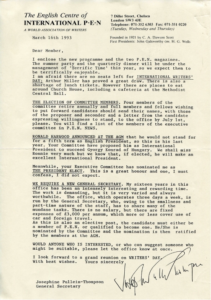
Members of English PEN were passionate about PEN’s mission to protect and speak up on behalf of writers under threat in oppressive regimes. Among activities, members, including notable British writers such as Ronald Harwood, Harold Pinter, and Antonia Fraser, who were good friends, and Moris Farhi, a Turkish/British novelist with a great beard, great girth and great heart, who later succeed me as Writers in Prison Chair, and dozens of other English PEN members held vigils, often by candlelight. They protested outside embassies of countries where writers were in prison. They got press coverage and ultimately helped secure the release of writers, particularly those in former Commonwealth countries like Malawi.
Malawian poet Jack Mapanje recalled his spirit lifting when he saw the press clippings of Harold Pinter and others protesting outside the Malawi Embassy in London on his behalf. When he was released, he resettled in England and joined English PEN.
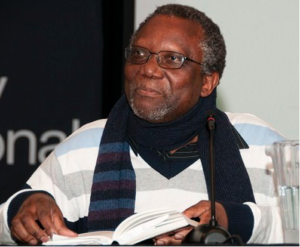
Jack Mapanje
Next Installment: Freedom and Beyond…War on the Horizon